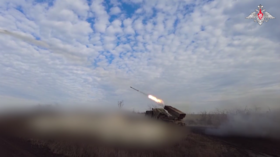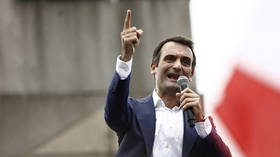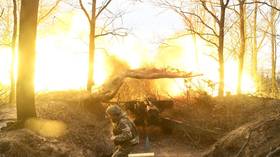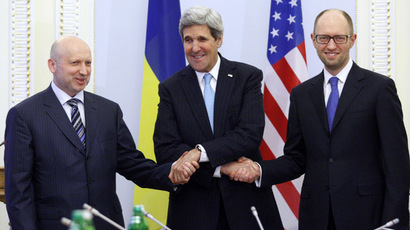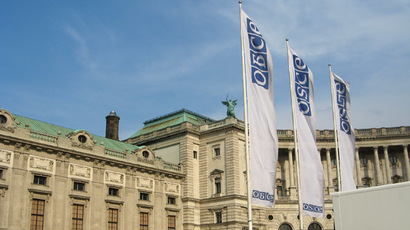Paving the future: Ukraine’s Crimea goes to independence poll
A crucial referendum on either becoming an integral part of Russia or staying within Ukraine on conditions of wide autonomy has kicked off in the Republic of Crimea despite international condemnation and pressure from Kiev.
Cold and raining in #Simferopol but voting going smoothly and people turning up at polling booths #Crimea #Crimeareferendum
— PaulaSlier_RT (@PaulaSlier_RT) March 16, 2014
The polling stations of 27 regional Crimean election commissions are going to be open all day long, from 8am until 8pm (0600 GMT- 1800 GMT). Up to 1.5 million people – this is the number of ballots printed for the referendum – are expected to cast their votes in favor of the republic either joining Russia or remaining part of Ukraine.
An exceptionally high turnout has already been registered at the referendum. More than 44 percent of Crimean residents (over 670,000 people) had taken part by noon, according to the head of the Crimean parliament’s commission on the referendum, Mikhail Malyshev.
By 11 am, one-third of Kerch residents had cast their ballots, while in Sevastopol 50 percent of the population had done so by noon, local officials said.
Extremely high turnout at this polling station. Haven't spoken to anyone yet who's voted against joining russia. pic.twitter.com/KiyJSmrN9b
— Ben Tobias (@ben_tobias) March 16, 2014
"We are already witnessing quite a high turnout in areas inhabited by Crimean Tatars,” an international observer and MP from Poland, Mateus Piskorski, told Itar-Tass. “That’s a very important fact that representatives of the Tatar minority are participating in the referendum.”
Before the referendum, there were calls by some of the Crimean Tatars’ leaders to boycott the event.
"I haven’t witnessed a single violation during the referendum,” Ewald Stadler, an international observer and member of the European Parliament told Itar-Tass. “I haven’t seen anything even resembling pressure. People themselves want to have their say.”
Some 10,000 members of the Crimean military recently formed from self-defense squads, and over 5,000 police officers are ensuring the referendum goes smoothly.
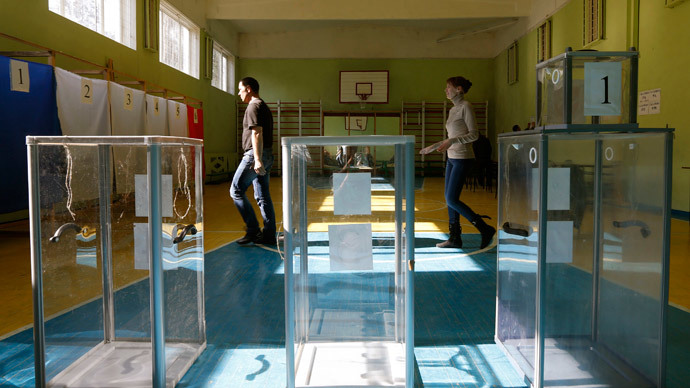
Crimean authorities have reported about 135 registered international observers have arrived from 23 countries, including Austria, Belgium, Bulgaria, France, Germany, Hungary, Italy, Latvia and Poland. Members of the EU and national European parliaments, international law experts and human rights activists together with 1,240 local observers are monitoring the voting at ballot stations. Mass media in the peninsula is represented by 623 accredited journalists from 169 international media outlets.
After a power grab took place in capital Kiev on February 22, Ukraine’s legitimate President Viktor Yanukovich had to flee from his residence fearing for his life. The parliament of the Crimea autonomy, where about 60 percent of the residents are ethnic Russians, did not acknowledge the coup-imposed government in Kiev as legitimate and took the decision to dissociate from Ukraine.
On March 11 the parliament of the Crimea autonomy adopted a declaration of independence from Ukraine, opening way for the referendum on March 16.

The referendum in Crimea was preceded with numerous provocations on the peninsula and threats coming from the capital Kiev and western politicians.
Since the moment Crimea set date for independence referendum, official Kiev has been claiming that all actions of the Crimea authorities are illegitimate, disregarding the international practice of referendums.
On Saturday Ukraine's parliament made the last desperate gesture to prevent the referendum, voting to dismiss the Crimean Supreme Council.
Two choices the voters will be given in the ballot during the Crimean referendum with the voters able to choose only one:
1) in favor of the reunification of Crimea with Russia as a part of the Russian Federation
2) in favor of restoring the 1992 Constitution and the status of Crimea as a part of Ukraine.
Though self-defense guards have done their best to prevent provocations in the peninsula, they took place anyway.
On the eve of the vote, Crimean self-defense forces prevented an attempt to damage a gas pipeline at the Arabat Spit. The people trying to damage the pipeline introduced themselves as officers of the Border Guard, the Crimean Prime Minister Sergey Aksyonov said.

In the Crimean capital of Simferopol an undisclosed number of people under the guise of policemen were detained for purposefully damaging civilians’ passports or taking away their documents to make it impossible for the citizens to vote in the absence of ID.
The same fraud has been also reported in the small town of Saky in western Crimea.
Nationalists from western Ukraine and Kiev, such as members of ultra-nationalist Right Sector group, made multiple attempts to sneak into the autonomous region to stage protests against Crimean independence.
Sometimes people shouting Nazi slogans joined peaceful demonstrations in Crimea’s cities, calling upon people not to vote in the referendum.
Despite that, mass pro-Russian protests have been held for the past weeks in the eastern regions of Ukraine and Crimea. The demonstrators were protesting against the new government, storming local government offices and replacing Ukrainian flags with the Russian tricolor. People in Simferopol, Odessa, Kharkov, Donetsk, Lugansk, Melitopol, Yevpatoria, Kerch and Mariupol – all took to the streets shouting slogans in support of the Crimean referendum.
According to a GfK poll of 600 residents taken Thursday and Friday ahead of the referendum, 70 percent said they will vote to become part of Russia, while 11 percent said they will vote to restore Crimea’s status as part of Ukraine.



